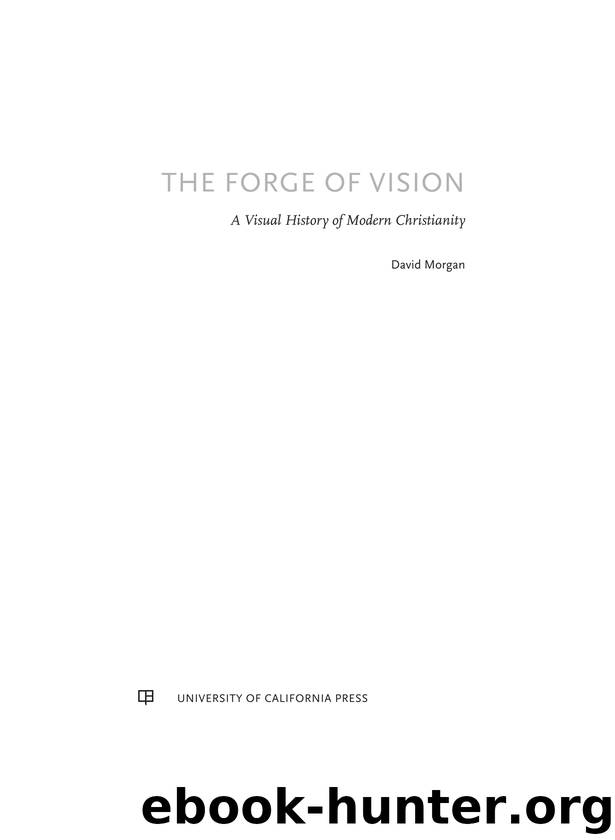The Forge of Vision by Morgan David

Author:Morgan, David
Language: eng
Format: epub
ISBN: 9780520286955
Publisher: University of California Press
FIGURE 38
“Great-Heart with Christiana and children,” in John Bunyan, Pilgrim’s Progress, part 2 (Boston: Joseph Bumstead, 1800), 164. Photo by author.
Violence serves in Pilgrim’s Progress as a necessary means for separating oneself from the corrupting city of the world in order to make the pilgrimage to Zion. No champion of tolerance, Bunyan put in the mouth of none other than Ignorance the pacific sentiment of relativism: “Be content to follow the Religion of your country, and I will follow the Religion of mine.” It was what Native Americans would tell Puritan colonists and it was the basis for negotiating territorial sovereignty in the peace treaties of Augsburg (1555) and Westphalia (1648) following the interminable religious conflicts: cuius regio, eius religio. But for Bunyan, and for the citizens of Puritan settlements in Massachusetts, violence against those infidels who threatened the community was a necessary means of preserving the community and maintaining its covenant with God. The illustration of Great-Heart leading Mercy, Christiana, and her four sons implied something powerful about the sovereignty of “mutual consent” that Winthrop identified as the political basis of his group’s migration to North America. Violence is not only a physical act but also a powerful form of imagination, able to draw the boundaries of those who envision its use by identifying authority, in the form of the bodies protected by violence and those damaged or destroyed by its use. The evocation of violence in literature, song, art, film, and folklore as well as in pious narrative likely constitutes the most prevalent role of violence in a national life. Imagining the destruction of “the bad guys” reinforces the broadly shared sense of a nation’s boundaries and moral rationale. Protestantism came to the New World with a clear preconception about group cohesion and the symbolic as well as actual role of violence in maintaining that cohesion. After all, the new Israel had patterned itself after the old one, whose God endorsed the sort of violence that Great-Heart practiced against the church’s foes, and which had been practiced on the church by monarch and state. Belief in the power of righteous and redemptive violence never left the American imaginary.
The tradition of Puritanism was arguably a living tradition in British America until the mid-eighteenth century. The Revolutionary War changed the key in which Puritanism was regarded, however. With the gradual ratification of the Bill of Rights, the disestablishment of religion became part of the culture of the new nation-state. But many Protestants, especially those of Calvinist descent, looked to the Puritan past as the proper ancestry of something many of them felt was now threatened by the separation of church and state: the Protestant ethos of the Christian nation. Rising immigration of Catholics in the 1830s and 1840s only exacerbated their anxiety. Evangelicals and other Protestants mobilized efforts at proselytism, tract and Bible distribution, the formation of Sunday schools, and promotion of the use of the King James Bible in public schools. Voluntary organizations such as the ATS and the
Download
This site does not store any files on its server. We only index and link to content provided by other sites. Please contact the content providers to delete copyright contents if any and email us, we'll remove relevant links or contents immediately.
The Gnostic Gospels by Pagels Elaine(2527)
Jesus by Paul Johnson(2352)
Devil, The by Almond Philip C(2325)
The Nativity by Geza Vermes(2227)
The Psychedelic Gospels: The Secret History of Hallucinogens in Christianity by Jerry B. Brown(2156)
Forensics by Val McDermid(2088)
Going Clear: Scientology, Hollywood, and the Prison of Belief by Lawrence Wright(1981)
Going Clear by Lawrence Wright(1963)
Barking to the Choir by Gregory Boyle(1819)
Old Testament History by John H. Sailhamer(1810)
Augustine: Conversions to Confessions by Robin Lane Fox(1770)
The Early Centuries - Byzantium 01 by John Julius Norwich(1740)
A History of the Franks by Gregory of Tours(1721)
A Prophet with Honor by William C. Martin(1719)
Dark Mysteries of the Vatican by H. Paul Jeffers(1717)
The Bible Doesn't Say That by Dr. Joel M. Hoffman(1677)
by Christianity & Islam(1628)
The First Crusade by Thomas Asbridge(1602)
The Amish by Steven M. Nolt(1564)
